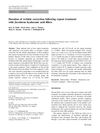TLDR Hyaluronic acid is effective for skin rejuvenation and should be a key ingredient in cosmetic products.
The review highlighted the multifaceted role of hyaluronic acid (HA) in skin rejuvenation, emphasizing its efficacy in treating wrinkles, nasolabial folds, and skin aging through various formulations like gels, creams, and injections. Clinical studies, including one with 158 patients, demonstrated significant improvements in skin appearance and soft tissue augmentation. HA's ability to stimulate collagen synthesis, improve skin hydration, and enhance skin elasticity and tightness was well-documented. The review concluded that HA, alone or combined with other agents, showed promising cosmetic and nutricosmetic effects, making it a prime component in skincare products.
 47 citations
,
January 2013 in “Indian Journal of Dermatology, Venereology and Leprology”
47 citations
,
January 2013 in “Indian Journal of Dermatology, Venereology and Leprology” Premature graying of hair may suggest health issues and currently lacks effective treatments.
 48 citations
,
October 2010 in “Archives of Dermatological Research”
48 citations
,
October 2010 in “Archives of Dermatological Research” Juvéderm fillers effectively reduce wrinkles for up to 21 months with less filler needed for repeat treatments.
May 2024 in “International journal of molecular sciences” Platelet-derived products help regenerate tissue and are used in various skin and hair treatments.
 20 citations
,
October 2018 in “Aesthetic Plastic Surgery”
20 citations
,
October 2018 in “Aesthetic Plastic Surgery” PRP shows promise for improving facial wrinkles, skin elasticity, and hair growth, but more research is needed to standardize its use and understand its effects.
 3 citations
,
November 2021 in “Clinical, Cosmetic and Investigational Dermatology”
3 citations
,
November 2021 in “Clinical, Cosmetic and Investigational Dermatology” Platelet-Rich Plasma may improve skin health and reduce wrinkles, but more research is needed for standard treatment guidelines.
 January 2024 in “Clinical, cosmetic and investigational dermatology”
January 2024 in “Clinical, cosmetic and investigational dermatology” Dermatologists should customize cosmetic treatments for dark-skinned patients to minimize risks and complications.
 January 2019 in “Springer eBooks”
January 2019 in “Springer eBooks” Platelet-rich plasma therapy may have benefits and is generally safe, but more research is needed to confirm its effectiveness and safety.





